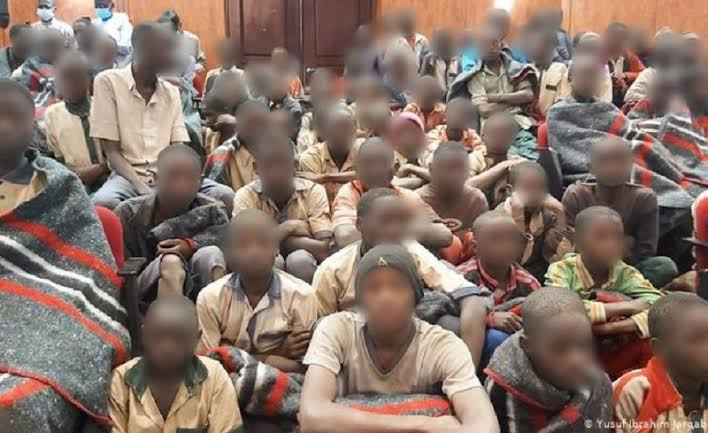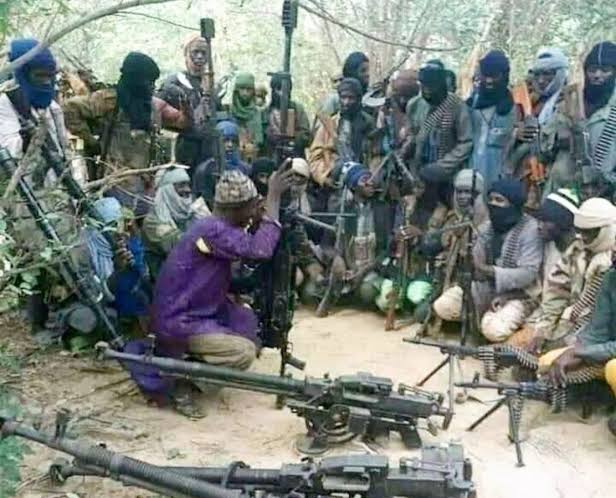Special Features
Unraveling The Enigma: Examining Recent Abductions In Northern Nigeria

This comprehensive report, delves into the intricate web of abductions currently plaguing Nigeria, especially in the North, shedding light on the multifaceted factors contributing to this concerning phenomenon.
It was in Borno’s Chibok town a decade ago that school kidnappings in Nigeria burst into the headlines with the 2014 abduction of more than 200 schoolgirls by Islamic extremists, shocking the world.
Editor’s Pick
- Tinubu To Decide On Border Reopening, Says Customs CG
- Foods You Are Allowed To Eat During Ramadan: Suhoor and Iftar Essentials
- Warri Residents Beware As Nkechi Blessing Issues Warning On Boo Xxssive Surprises To Her
Since the 2014 abduction in Chibok of 276 schoolgirls, which sparked the global #BringBackOurGirls social media campaign, at least 1,400 Nigerian students have been seized from their schools in similar circumstances. Some are still in captivity, including nearly 100 of the Chibok girls.
On Thursday, 7th March, in Kaduna State, a total number of about 287 students from the LEA Primary and Secondary School in Kuriga, Kaduna State, were kidnapped when bandits attacked the school premises. Among the students abducted that fateful day were at least 100 children aged 12 or younger. They were just settling into their classrooms at the government primary and secondary school when gunmen “came in dozens, riding on bikes and shooting sporadically,” said Nura Ahmad, a teacher.

Rashidat Hamza, parents to five of the abducted children, was in despair. All but one of her six children are among the nearly 300 students abducted from their school in Nigeria’s conflict-battered northwest. She said, “We have never seen this kind of thing where our children were abducted from their school,” she told an Associated Press team that arrived in the Kaduna State town to report on Thursday’s attack. “We don’t know what to do, but we believe in God.”
More than two days after her children — ages 7 to 18 — went to school in remote Kuriga town only to be herded away by a band of gunmen, she was still in shock till Saturday.
As this kidnap epidemic across Nigeria, a majorly northern part persists, it raged on as Sokoto State was another victim of the mass kidnap of schoolchildren.
Police in Sokoto confirmed that bandits abducted 15 Tsangaya schoolchildren and one woman at Gidan Bukaso, Gada Local Government Area (LGA) of Sokoto State. The authorities confirmed the incident, which happened around 10:00 am when the bandits invaded the community.
As the frequency of abductions surges, different bodies have tried to dissect the root causes and dynamics fueling this alarming escalation, addressing the socio-economic, political, and security implications on a national scale.
This illuminates the diverse demographics of abduction victims, emphasizing the vulnerabilities that make certain groups more prone to being targeted, ranging from geographic location to socio-economic status.

An in-depth analysis reveals the identities and motivations driving those responsible for the abductions. This explores the intricate network of criminal organizations and delves into their varied motivations, from financial gain to ideological pursuits.
No group has claimed responsibility for any of the recent abductions. But Islamic extremists waging an insurgency in the northeast are suspected of carrying out the kidnapping in Borno. Locals blame the school kidnappings on herders who conflict with the settled communities.
Examining the strategies and initiatives implemented by the Nigerian government to curb these abductions, it is noteworthy to assess the effectiveness of these current interventions and explore potential avenues for improvement in ensuring the safety of citizens. Elites and human rights activists have argued that fighting this epidemic has now become the responsibility of every sector (government and non-governmental) and citizen of the nation.
Further Reading
- Shettima Meets With Parents Of Abducted Kaduna Pupils, Assures Safe Return Of Minors
- Troops Kill Suicide Bomber, Two Others In Sambisa Forest
- Binance Exit Will Worsen Unemployment Among Nigerian Youths – Expert Warns
More than a dozen checkpoints and military trucks now dot the 55-mile (89 kilometers) road that runs from Kuriga town to the city of Kaduna. But the soldiers are likely to soon be deployed elsewhere, whenever a new security incident requires that troops provide a presence. People in Kuriga can only hope that the schoolchildren return unhurt and that the security they feel now with the military trucks around endures.
In conclusion, there is a need to synthesize key findings and propose recommendations for a holistic approach to combating abductions in Nigeria, emphasizing the need for collaborative efforts between government entities, law enforcement, and communities to foster lasting solutions.
Click here to watch our video of the week
Advertise or Publish a Story on EkoHot Blog:
Kindly contact us at [email protected]. Breaking stories should be sent to the above email and substantiated with pictorial evidence.
Citizen journalists will receive a token as data incentive.
Call or Whatsapp: 0803 561 7233, 0703 414 5611

















